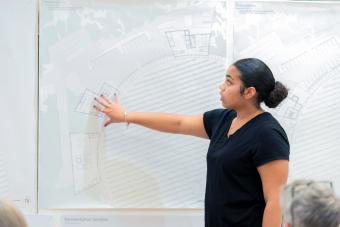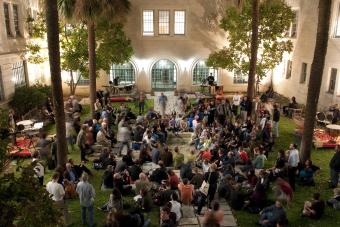The program leading to the Ph.D. in the area of Architectural History builds on the master's degree and provides students with advanced training to prepare them to teach and conduct research at the highest level. Students who have completed a Master's degree must apply for continuation to the Ph.D. level.
The Ph.D. requires a minimum of 21 hours of coursework leading to the comprehensive examination. The comprehensive examination tests general knowledge of architectural history, an area of concentration, and a minor area. Students must also demonstrate reading proficiency in a second language approved by the doctoral subcommittee.
Following successful completion of comprehensive examinations, the student develops a dissertation topic and makes a public presentation to the doctoral subcommittee, which then recommends candidacy to the Dean of the Graduate School. The research, writing, oral defense, and revision of the dissertation follow.
The number of degree hours may vary depending on the student's individual situation, previous background, interests, and needs. The length of time required to complete a dissertation varies according to individual situations but should normally be completed within two years.
DEGREE REQUIREMENTS
The doctoral subcommittee of the Architecture Graduate Studies Committee determines course requirements, prescribes qualifying examinations, and approves dissertation topics. The degree plan requires a minimum of thirty hours. Twenty-one of these hours consist of seminars and reading courses leading to the qualifying examination. Nine of these hours must satisfy the program's core requirements, as specified by the doctoral subcommittee (credit may be awarded for core courses taken as part of a School of Architecture master's program). Nine of the remaining hours are to be taken outside the School of Architecture.
All tracks require experience in design, which may be gained through design studio coursework or professional practice; reading proficiency in one foreign languages appropriate to the area of specialization; and/or proficiency in qualitative or quantitative analysis, as determined by the doctoral subcommittee.
QUALIFYING EXAMINATION
The qualifying, or comprehensive, examination demonstrates broad mastery of the field of study in which the dissertation will be situated. In practical terms, it establishes a credential for teaching at the college level. The student's Program Director and the doctoral subcommittee in consultation with other faculty determine the scope of the examination and select the examiners. The examination consists of a written exam spread over two days followed shortly thereafter by an oral exam, which is open to other faculty and students.
DISSERTATION COLLOQUIUM
The dissertation colloquium culminates the preparation of the dissertation proposal. The student presents the proposal for consideration by the doctoral subcommittee, prospective members of the dissertation committee, and other interested faculty and students. Upon approval of the dissertation proposal and formation of the dissertation committee, the doctoral subcommittee will recommend the student's promotion to candidacy status.
DISSERTATION
The doctoral dissertation must make an original contribution to scholarship. It normally requires at least two years of research and writing. The work is directed by a dissertation committee consisting of five or six members including a supervisor (or co-supervisors) and at least one member from outside the School of Architecture. The oral defense of the dissertation is a public event scheduled through the Graduate School.
CONTACT
Charles L. Davis II
Associate Professor
Program Director for Architecture Ph.D.
charles.davis@austin.utexas.edu
RELATED

APPLICATION INSTRUCTIONS


